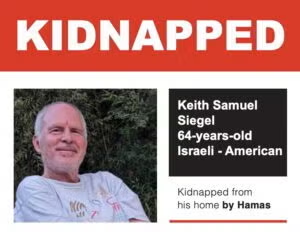With President Donald Trump’s inauguration less than a week away, Hamas has agreed to a deal that includes a ceasefire and the release of the hostages being held in Gaza.
“Soon, the hostages will be returned home to their families,” President Joe Biden said during a press conference Wednesday afternoon before going on to explain the known details of the agreement.
After 15 months of war between Israel and Hamas following Hamas’ terrorist attack on Oct. 7, 2023, that left 1,200 people dead and another 251 people hostage in Gaza, a ceasefire is expected to begin Sunday.
The deal, which includes an initial six-week ceasefire, involves three phases, Biden said.
Phase One
Phase one of the deal includes an immediate end to the fighting in Gaza, the withdrawal of the Israel Defense Forces from populated areas of Gaza, and the release of 33 hostages, including women, children, the elderly, and the wounded.
Biden added that the “Americans will be part of that hostage release in phase one as well,” but did not specify which American hostages remaining in Gaza would be released during the first phase.
CNN was the first to report Wednesday night that Israeli American hostages Keith Siegel, 65, and Sagui Dekel-Chen, 36, are among the 33 hostages to be released in phase one. Israeli American Edan Alexander, 21, is not reported to be on the list for release in the first phase. The bodies of four other Americans are also being held in Gaza.
Israel has agreed to release hundreds of Palestinian prisoners in exchange for the hostage, including some terrorists convicted of murder.
Under the agreement, three female hostages are expected to be released in the first days of the ceasefire, followed by another four several days later, and the remaining 26 hostages over the following five weeks.
Stage one also includes an influx of 600 aid trucks into Gaza daily.
Second and Third Phase
The details of the second phase of the deal will be negotiated during the initial six-week ceasefire and are to include the release of all living hostages remaining in Gaza. The second phase is slated to also include the full withdrawal of all Israeli troops from Gaza and a permanent end to the war between Israel and Hamas. Even if negotiations on phase two extend past the six weeks, the ceasefire will remain in place as long as negotiations continue, Biden said.
The final phase of the deal includes the return of the remains of killed hostages to their families and the start of a reconstruction plan beginning in Gaza.
How the Hostage Deal Was Reached
Negotiations for the deal were held in Qatar and mediated by officials from Qatar, Egypt, and the United States.
Biden’s envoy Brett McGurk and Trump’s incoming Middle East envoy Steve Witkoff both attended the talks hosted in recent days that Qatar’s Prime Minister Sheikh Mohammed bin Abdulrahman Al Thani hosted.
U.S. State Department spokesman Matthew Miller told press Wednesday that the involvement of Trump’s team “has been absolutely critical in getting this deal over the line,” adding that since Biden’s term ends in five days, having support from the Trump administration to carry the deal forward is essential.
The president-elect celebrated news of the deal Wednesday, calling it “EPIC,” and pledged that his administration “will continue to work closely with Israel and our allies to make sure Gaza NEVER again becomes a terrorist safe haven.”
Trump has warned multiple times in recent weeks that there will be “hell to pay” in the Middle East if the hostages are not released by his inauguration on Jan. 20, a statement that has received widespread praise from hostages’ family members.
“Pretty clearly we see this Trump effect … it’s working,” Adi Alexander, the father of 21-year-old Israeli American hostage Edan Alexander, told The Daily Signal during a recent interview.
It is not yet clear when Edan Alexander will be released, but “whoever comes out from there, it’s a blessing,” Alexander’s father said ahead of the deal’s release.
Israeli American Dekel-Chen is expected to be released in phase one. He is a husband and father of three girls, the youngest of whom he has never met because she was born two months after he was taken hostage.

“I would say all of the hostage families, and I would say almost all Israelis, were incredibly appreciative of that clear statement from the president-elect,” Jonathan Dekel-Chen, the father of Sagui Dekel-Chen, told The Daily Signal shortly after Trump issued his warning to the Middle East in December.
Israeli American hostage Siegel is also expected to be released in the first phase of the deal.

Aviva Siegel, the wife of Keith Siegel, has been waiting for her husband’s release since she was set free from captivity during a short ceasefire deal between Israel and Hamas in November 2023.
“My heart will explode,” Aviva Siegel told The Daily Signal during an interview in December when asked what she will do when her husband is finally freed. “I will scream. I will jump into the air, and it’s just going to be … I don’t know, I’ll dance. I’m sure that I’ll dance and scream.”
Aviva Siegel and all of the family members of the hostages will soon have the opportunity to “dance and scream” as they are reunited with their loved ones in the coming days, should the deal go through.
Following the initial release of the 33 hostages, an additional 61 hostages will remain in Gaza, about half of whom are believed to be dead.
Response in Gaza
Following the news of the deal, multiple videos were shared across social media of men cheering in the streets of Gaza and yelling “Allahu Akbar,” which translates to “God is most great.”
Senior Hamas official Khalil al-Hayya pegged the deal as a “victory” for Hamas in a speech reported by The Palestinine Chronicle. He added, “We honor all the martyr leaders of Hamas.”
Ahmed F. Alkhatib, a resident senior fellow with the Scowcroft Middle East Security Initiative at the Atlantic Council’s Middle East Programs, predicted in a post on X Wednesday evening that “Hamas will regain control of Gaza even while the IDF is there, just as fast as the Taliban took over Afghanistan before the US completed the withdrawal.” He was referring to the fall of Kabul in 2021.
“They are literally remerging from displacement tents … with uniforms, insignia, vehicles & guns,” Alkhatib wrote above a the video he shared.
Rep. Mike Waltz, R-Fla., whom Trump has tapped to serve as his national security adviser, told CNN on Wednesday that the incoming Trump administration has “made it very clear to our ally Israel that if Hamas reneges on any parts of this deal, we are with them. And that Gaza will be demilitarized, and Hamas will be destroyed.”
“Right now,” Waltz added, “we should be celebrating that we are going to have people coming out alive.”
This article was originally published at www.dailysignal.com















